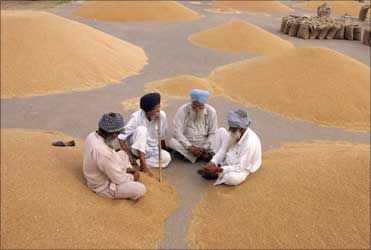 | « Back to article | Print this article |
 India is not prepared for any compromise on the food security issue and the deal at Bali has to be fair and balanced, Commerce Minister, Anand Sharma said after taking a firm stance on the issue. It is better not to have an agreement rather than have bad one, he said.
India is not prepared for any compromise on the food security issue and the deal at Bali has to be fair and balanced, Commerce Minister, Anand Sharma said after taking a firm stance on the issue. It is better not to have an agreement rather than have bad one, he said.
While the stand taken by India is extremely impressive, the next two days would be crucial. Prime Minister Manmohan Singh will have a chance finally to prove his mettle and if he sticks to India’s stand at Bali when he gets a call from US President Barack Obama, he would have probably done the best thing as Prime Minister, feels, Devinder Sharma, a trade policy analyst and an award-winning journalist.
Devinder Sharma who is also trained as an agricultural scientist speaks with Rediff.com about the World Trade Organisation and India’s stand on the food security issue in detail.
The stand taken by India is a very brave one and is also an important milestone. I am very impressed with India’s ability to stand up and defy the international regime which has no regard for the food security of 600 million farmers and 800 million hungry people.
It is probably for the first time that we have taken such a tough stance and we must stick by it. Let us be clear here about one thing. In 2008, the talks had failed when the interest of the United States of America was to protect its cotton subsidy. At that time around they did not bother about the WTO and were worried about their own interests.
Moreover it was the election year there. India does not need to be more royal than the King. When the US could put the negotiations on the backburner at that time, so can we. We need to protect our own interests too. Remember that the WTO is a dying horse and India does not need to protect it. If it is dying then let it die.
Just because the negotiations have failed this time, why India should be blamed? Did the US bother in 2008? We have so many bilaterals and really do not worry about the WTO. We cannot slaughter the people for the sake of the WTO.
We need to understand that India is very justified in putting up a brave fight on the issue. What exactly is happening is that the US is not challenging our food subsidy. The actual challenge is the income support that India provides to its farmers.
If we are now asking our farmers to procure rice at Rs 1,310 per quintal, we need to stick to it in the interest of the farmers. Just imagine we buckle to the US and start telling our farmers to procure rice at Rs 600.
The outcome will be disastrous and the farmer will kill himself. So basically the US is opposed to the income support and not the food subsidy as it is being made to look. More income support to our farmers would mean they will produce more and this hurts the interests of the US commercially.
It is basically a battle between the India and American farmers. They would be happy if the Indian farmer produced less and we imported rice from them instead. This is the whole crux of the matter.
This is a real test for our Prime Minister. In 2008, President Bush had called our PM four times on the issue. Now expect a call from Barrack Obama on the very same issue.
This is a real test for the PM who has failed on several fronts.
He has often accused of succumbing to the US and this is his best chance to prove otherwise. The next two days would be crucial and we hope he does not bow before the US.
What India needs to continue doing is say that the issue is non-negotiable. We should instead demand a food security box in order to protect the livelihood of the farmer and the food security of the hungry.
We should continue to insist that the talks will move on provided there is a solution on food security and not sign any interim agreement or the peace clause.
I would like to draw your attention to an issue concerning the United States and Brazil. The US was taken to the dispute panel by Brazil on the cotton subsidy issue. Brazil was allowed to impose contravening duties to US exports.
The US actually gave $147 million to the farmers in Brazil as subsidy which in other words is nothing but a bribe. This way they managed to hoodwink the WTO.
What India needs to be careful about is that the US does not try the same with our farmers. We need to be very careful and resist what I would call sweet coercion.